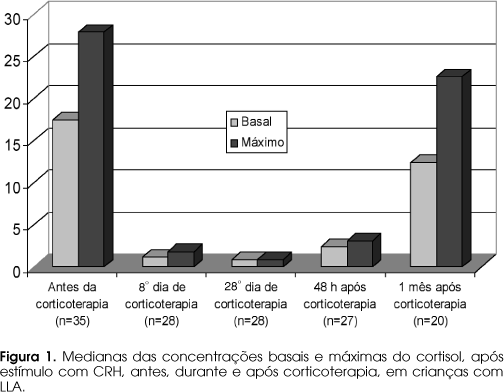The glucocorticoid-induced inhibition that occurs after discontinuation of treatment is the most frequent cause of adrenal insufficiency. There are yet some doubts about the best way of evaluating the hypothalamic-pituitary-adrenal (HPA) axis in those patients. The main objective of this study was to evaluate the utility of basal cortisol in diagnosing adrenal insufficiency. Thirty-five children with acute lymphoid leukemia (ALL) receiving glucocorticoid therapy (median age of 6.9 years) were evaluated. A stimulus test with corticotropin releasing hormone (CRH 1 mcg/kg) was performed before the introduction of dexamethasone (6 mg/m²/day, for 28 days), in the 8th and the 28th days of glucocorticoid therapy, and 48 hours and one month after discontinuation of therapy. Suppression of the basal secretion as well as the maximum concentration of cortisol (post-CRH) occurred during glucocorticoid therapy, which persisted for 48 hours after the steroid was removed from treatment (p< 0.01 and p< 0.0001, respectively, for the three tests). One month after ceasing the administration of the glucocorticoid, the basal secretion, as well as the maximum concentration of cortisol, were similar to that before glucocorticoid therapy. There was a positive and statistically significant correlation between basal secretion and maximum concentration of cortisol in all tests. We observed 95% of specificity for the diagnosis of adrenal insufficiency when the inferior limit of basal cortisol was 8.5 mcg/dl. According to these results we concluded that basal secretion of cortisol is a good marker of supra-renal function in evaluating children after discontinuation of glucocorticoid therapy.
Basal cortisol; Glucocorticoids; ALL; Adrenal insufficiency



